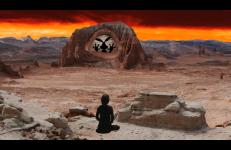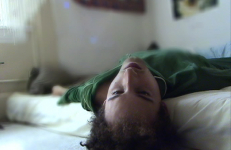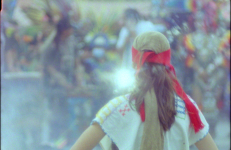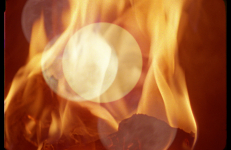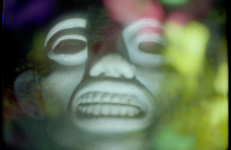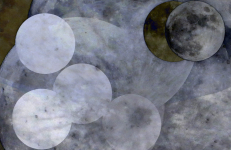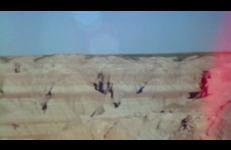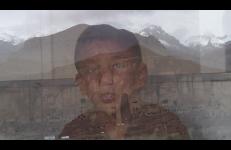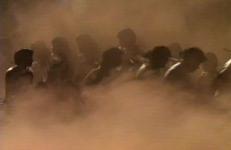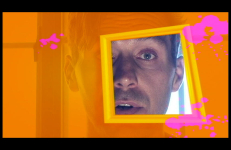A collage piece. Oppositions of agony and ecstasy are explored. Morticia trims yet another rose stem, while Bugs Bunny takes up Zen. Guilt-wracked, a nun tries furtively to cleans herself of imagined sin. Or attain spiritual release. Various divas flail to no avail. Lips, lipstick, frozen lips. Shakuhachi music by Chris Moran sets the mood, when there isn’t a thunderstorm raging.
Religion/Spirituality
Behind the yellow gates is a realm that sparkles like diamonds under a desert sun. It is a realm ablaze with outrageous flowers, fragrant and poisonous… A realm populated by bare skin scared by flashing swords and marked with stone idols… It is that subterranean consciousness; a land of Mind-in-Time that sends unholy incense up toward Heaven.
These are the dancing bodies in an agitated rapture: prelude to trance, invocation of the gods, consecration of intermittence. Here our point of view sparkles under the spell and trance of things gathered, fallen, yielding, pluvial, Mesoamerican wind, goddess breath, breeze of sticks. percussive woods.
Time Bomb tells the story of a young girl's experience at a Baptist retreat, where she is called upon to accept Jesus into her life after a coercive game of terror. This piece explores memory, the power of crowds, rituals of conversion, and the isolation of a child lost in the world of adults. Fear and family values motivate action and create an empty arena for escape. Visually, Time Bomb proceeds through a sequence of images that figure the "light" of memory as simultaneously revelatory and obscuring, constructive and destructive.
Time Bomb tells the story of a young girl's experience at a Baptist retreat, where she is called upon to accept Jesus into her life after a coercive game of terror. This piece explores memory, the power of crowds, rituals of conversion, and the isolation of a child lost in the world of adults. Fear and family values motivate action and create an empty arena for escape. Visually, Time Bomb proceeds through a sequence of images that figure the "light" of memory as simultaneously revelatory and obscuring, constructive and destructive.
Tlecáxitl is the sacred furnace where the new fire begins. This is the place where the sun, the moon and fire coincide in their cosmic dance to unleash vital irradiation. Part of Tonalli.
“Drawing on the ancient Nahuatl concept of the animating soul or life force, Tonalli engages the ritualistic powers of the cinema, summoning fire, flowers, and many moons into a frenetic and mesmerizing in-camera collage. Here, amid thickly swirling images and textured abstractions, the gods of creation and fertility manifest, dissolving into iridescent colors and dense, corporeal rhythms.” NYFF59
Tortillas are an ancestral and sacred food, our transmuted corn. The circular nourishment that represents the luminous and colorful side of the moon on which our life is nourished. This is the cosmic dance of the colorful Tortilla with the hyperkinetic fire that sustain our bodies and souls. Part of the Lunar Films series.
The projection and screens in this installation are access points meant to connect the present to an ancestral past. Evoking the ritualism of Aztec cosmology, this experience recalls lumbreras – circular excavation holes in archeological sites, such as the recently found Tzompantli (skulls ceremonial rack) at the Templo Mayor in Tenochtitlan (Mexico City). The use of obsidian crystal as a nuclear filter in the chamber is also essential.
The projection and screens in this installation are access points meant to connect the present to an ancestral past. Evoking the ritualism of Aztec cosmology, this experience recalls lumbreras – circular excavation holes in archeological sites, such as the recently found Tzompantli (skulls ceremonial rack) at the Templo Mayor in Tenochtitlan (Mexico City). The use of obsidian crystal as a nuclear filter in the chamber is also essential.
The projection and screens in this installation are access points meant to connect the present to an ancestral past. Evoking the ritualism of Aztec cosmology, this experience recalls lumbreras – circular excavation holes in archeological sites, such as the recently found Tzompantli (skulls ceremonial rack) at the Templo Mayor in Tenochtitlan (Mexico City). The use of obsidian crystal as a nuclear filter in the chamber is also essential.
The projection and screens in this installation are access points meant to connect the present to an ancestral past. Evoking the ritualism of Aztec cosmology, this experience recalls lumbreras – circular excavation holes in archeological sites, such as the recently found Tzompantli (skulls ceremonial rack) at the Templo Mayor in Tenochtitlan (Mexico City). The use of obsidian crystal as a nuclear filter in the chamber is also essential.
“Trypps #7 (Badlands) charts, through an intimate long-take, a young woman's LSD trip in the Badlands National Park, before descending into a psychedelic, formal abstraction of the expansive desert landscape. Concerned with notions of the romantic sublime, phenomenological experience, and secular spiritualism, the work continues Russell's unique investigation into the possibilities of cinema as a site for transcendence.”
-- Michael Green, Museum of Contemporary Art, Chicago
Amidst growing discussions on the headscarf issue, the President of Turkey was holding the annual Republic Day Ball at the Presidential Palace. For the reception he sent one-person invitations to the members of the Parliament whose majority was held by the Islamic Democrats. This was his strategy to prevent their wives, who would naturally wear headscarves, from attending the night. I was outraged by this conservative secularism and wanted to express my personal protest, embodying the stress on the contemporary Islamic body. --Köken Ergun
Out of the mouths of rural boys, finding the incomparable Mulla Nasrudin in Afghanistan.
On February 10th, 2005, Lynne Stewart was convicted of providing material support for a terrorist conspiracy. She is the first lawyer to be convicted of aiding terrorism in the United States. Stewart was convicted on charges of conspiracy and providing material support to terrorists in 2005, and sentenced to 28 months in prison. Her felony conviction led to her being automatically disbarred. She was re-sentenced on July 15th, 2010, to ten years in prison in light of her perjury at trial.
A multiple award winner, this experimental tape explores the psychological ramifications of a woman growing up under orthodox Islamic law. Resisting traditional definitions of a woman’s role in society as first and foremost a dutiful daughter or wife, Nanji struggles to find a space amidst the web of restrictive familial and societal conventions.
Within the long cycle of initiation ceremonies of the Xavante People, the Wai’a celebration introduces young men to spiritual life and puts them in contact with supernatural forces. Filmmaker Divino Tserewahu speaks with his father (one of the leaders of this ritual) about what can be disclosed of this secret celebration of men, where the initiated go through many trials and tribulations.
Directed by Divino Tserewahú.
In Xavante with English subtitles.
Among the Xavante of Mato Grosso, the Wai’a is an important stage in a male initiation ritual that happens once every 15 years. Wai’a: The Secret of Men documents the ceremonies that prepare young men for contact with supernatural forces. The young people of the village directed the filming and assisted with the editing to make a record for the next generation.
Directed by Virginia Valadão.
In Xavante with English subtitles.
Among the Xavante of Mato Grosso, the Wai’a is an important stage in a male initiation ritual that happens once every 15 years. Wai’a: The Secret of Men documents the ceremonies that prepare young men for contact with supernatural forces. The young people of the village directed the filming and assisted with the editing to make a record for the next generation.
Directed by Virginia Valadão.
In Xavante with English subtitles.
The Wake was filmed at the Invertebrate Zoology department of the Carnegie Natural History Museum in Pittsburgh. In this department there are old cabinets full of categorized butterfly specimens, neatly ordered in drawers. I released into this space 100 live butterflies that flew among the dead specimens. The result is as if these dead specimens have now come to life.
Two guys with their heads in the clouds and their feet in the mud of the world, can not be Angels until their earthbound urges are tamed. Despite the overwhelming odds against this, the handsome, hot blooded boys are determined to earn their 'halos' and win their heavenly 'wings'.
Shot with my students at the San Francisco Art Institute, this colorful drama with song and dance numbers (plus burlesque acts) follows the libidinous poisoning of Vatican personnel by an otherworldly intruder. The cast is mostly young and vibrant and the songs staged as opulently as possible on a $400 budget. Anyone interested in these collaborative productions will find a lot to gawk at in this backstage romance with pagan overtures galore.




